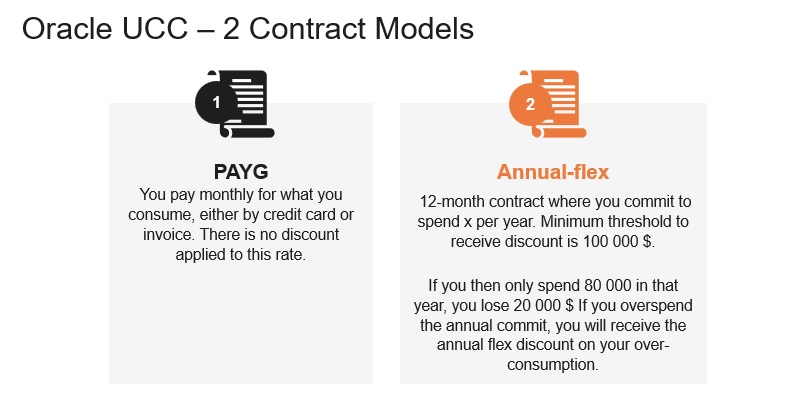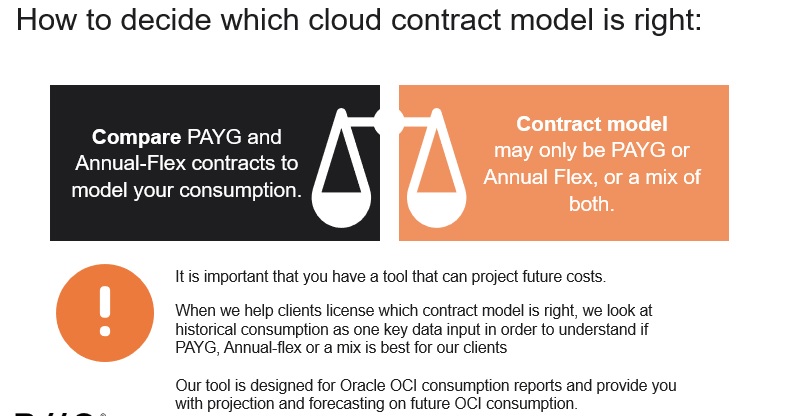
Oracle Universal Cloud Credits – Overview
Oracle Universal Cloud Credits (UCC) are a flexible and convenient way for businesses to purchase and use cloud-based services from Oracle. With UCC, businesses can purchase a set amount of credits that can be used to access a variety of Oracle cloud services, including infrastructure, platform, and application services.
Oracle Universal Cloud Credits (UCC) can be used to purchase a variety of cloud-based services from Oracle, including infrastructure, platform, and application services. Some examples of services that UCC can be used for include:
- Compute: UCC can be used to purchase computing resources, such as virtual machines, containers, and serverless functions.
- Storage: UCC can be used to purchase storage services, such as object storage, block storage, and file storage.
- Networking: UCC can be used to purchase networking services, such as load balancers, VPNs, and DNS.
- Databases: UCC can be used to purchase database services, such as MySQL, Oracle Database, and Autonomous Database.
- Analytics: UCC can be used to purchase analytics services, such as data warehousing, big data, and machine learning.
- Security: UCC can be used to purchase security services, such as identity and access management, data encryption, and threat protection.
- Integration: UCC can be used to purchase integration services, such as API management, messaging, and event-driven computing.
- Management and Governance: UCC can be used to purchase services for managing and governing cloud resources, such as monitoring, backup, and recovery.
Overall, UCC can be used to purchase a wide range of cloud-based services from Oracle, depending on the specific needs of a business. By choosing the right combination of services, businesses can create a comprehensive cloud solution that meets their needs and helps them achieve their goals.
Oracle Universal Cloud Credits – Contract Models
There are two main options for purchasing UCC: annual-flex and pay-as-you-go. Here is a comparison of the two options:
Annual-Flex:
- With annual-flex, businesses purchase a set amount of UCC upfront and have a year to use them.
- Annual-flex offers a discounted rate compared to pay-as-you-go, making it a more cost-effective option for businesses that have predictable cloud usage patterns.
- Annual-flex provides greater flexibility compared to pay-as-you-go, as businesses can use their credits for any Oracle cloud service, including those that are not yet available.
- Annual-flex credits do not expire, so businesses can carry over any unused credits to the next year.
- Annual-flex is suitable for businesses that have a clear understanding of their cloud usage needs and want to lock in a discounted rate.
Pay-As-You-Go:
- With pay-as-you-go, businesses only pay for the cloud services they use, with no upfront commitment.
- Pay-as-you-go offers greater flexibility compared to annual-flex, as businesses can scale up or down their usage as needed.
- Pay-as-you-go is suitable for businesses that have unpredictable or fluctuating cloud usage needs and want to pay only for what they use.
Overall, the best option for a business will depend on its specific needs and budget. Businesses should carefully consider their cloud usage patterns and evaluate the pros and cons of each option before making a decision.

In conclusion, Oracle Universal Cloud Credits are a flexible and convenient way for businesses to purchase and use cloud-based services from Oracle. The annual-flex and pay-as-you-go options offer different benefits and are suitable for different types of businesses, depending on their cloud usage patterns and budget. By carefully considering their needs and evaluating the options, businesses can choose the best option for them.
Oracle Universal Cloud Credits Negotiation
Oracle Universal Cloud Credits (UCC) can be a flexible and convenient way for businesses to purchase and use cloud-based services from Oracle. If you are interested in negotiating a UCC deal with Oracle, here are some steps you can follow:
- Determine your cloud usage needs: Before you begin negotiations, it is important to have a clear understanding of your cloud usage needs. This includes considering the types of cloud services you will be using, the amount of usage you anticipate, and any specific requirements or constraints you have. Having this information will help you make informed decisions during negotiations.
- Research pricing and options: Oracle offers a range of UCC options, including annual-flex and pay-as-you-go. It is important to research these options and compare pricing to determine which option is the best fit for your needs. You can also consider negotiating custom pricing or terms that are tailored to your specific needs.
- Prepare a negotiation strategy: Once you have a clear understanding of your needs and the available options, you can begin preparing a negotiation strategy. This may involve identifying your priorities and the areas where you are willing to compromise, as well as determining your budget and any constraints you have.
- Contact Oracle: Once you have prepared your negotiation strategy, you can contact Oracle to initiate negotiations. This may involve reaching out to an Oracle sales representative or engaging with the Oracle Cloud Marketplace.
- Negotiate terms and pricing: During negotiations, you will have the opportunity to discuss your needs and priorities with Oracle and negotiate terms and pricing that are suitable for your business. It is important to be transparent and clear about your needs and to be willing to compromise where necessary.
Overall, negotiating a UCC deal with Oracle requires careful planning and clear communication. By following these steps, you can negotiate terms and pricing that are suitable for your business and help you get the most value from your UCC.
Recommendations for OCI Management
Here are some recommendations for managing Oracle Cloud Infrastructure (OCI) consumption and reducing costs:
- Monitor usage and optimize resources: Regularly monitoring your OCI usage and resource utilization can help you identify areas where you may be over- or under-utilizing resources. You can then optimize your resource allocation to ensure that you are using the right amount of resources for your needs.
- Use autoscaling: Autoscaling can help you automatically adjust the number of resources you are using based on demand. This can help you avoid over-provisioning resources when demand is low and ensure that you have enough resources when demand is high.
- Use reserved instances: Purchasing reserved instances can help you save on costs by committing to a set amount of usage over a longer period of time. This can be a cost-effective option for businesses with predictable usage patterns.
- Utilize free tiers and credits: Oracle offers free tiers and credits for certain services, which can help you reduce costs. Be sure to take advantage of these offers to minimize your spending.
- Consider using spot instances: Spot instances allow you to bid on unused OCI resources at a discounted rate. This can be a cost-effective option for businesses that have flexible workloads and are willing to accept the risk of instances being terminated due to changes in demand.
- Use cost optimization tools: Oracle provides a range of tools and resources to help businesses optimize their OCI costs, including the Cloud Advisor, the Cloud Cost Management platform, and the Cloud TCO Calculator. These tools can help you identify areas where you can save on costs and make informed decisions about your resource allocation.
Overall, managing OCI consumption and reducing costs requires careful planning and regular monitoring. By following these recommendations, you can optimize your resource usage and minimize your spending on OCI.
How can Reveal Compliance – Cloud Experts help?
Our company offers a comprehensive Oracle Cloud Infrastructure (OCI) management service designed to help businesses optimize their OCI costs and get the most value from their investments. Here is a description of the services we offer:
- Usage monitoring: We regularly monitor our customers’ OCI usage and resource utilization to identify areas where they may be over- or under-utilizing resources. This helps us identify opportunities for cost optimization and ensure that our customers are using the right amount of resources for their needs.
- Resource optimization: Based on our usage monitoring, we can recommend changes to our customers’ resource allocation to optimize their OCI costs. This may involve adjusting the number and types of resources they are using, as well as implementing autoscaling to automatically adjust resource usage based on demand.
- Reserved instance management: We can help our customers purchase and manage reserved instances to take advantage of discounted rates for long-term usage commitments. This can be a cost-effective option for businesses with predictable usage patterns.
- Free tier and credit utilization: We help our customers identify and take advantage of free tiers and credits offered by Oracle, which can help them reduce their OCI costs.
- Spot instance management: For businesses with flexible workloads, we can help them bid on and manage spot instances to take advantage of discounted rates on unused OCI resources.
- Cost optimization tools: We provide our customers with access to a range of Oracle cost optimization tools, including the Cloud Advisor, the Cloud Cost Management platform, and the Cloud TCO Calculator. These tools can help our customers identify areas where they can save on costs and make informed decisions about their resource allocation.
Overall, our OCI management service is designed to help businesses optimize their OCI costs and get the most value from their investments. By leveraging our expertise and tools, we can help our customers make informed decisions about their resource allocation and minimize their spending on OCI.